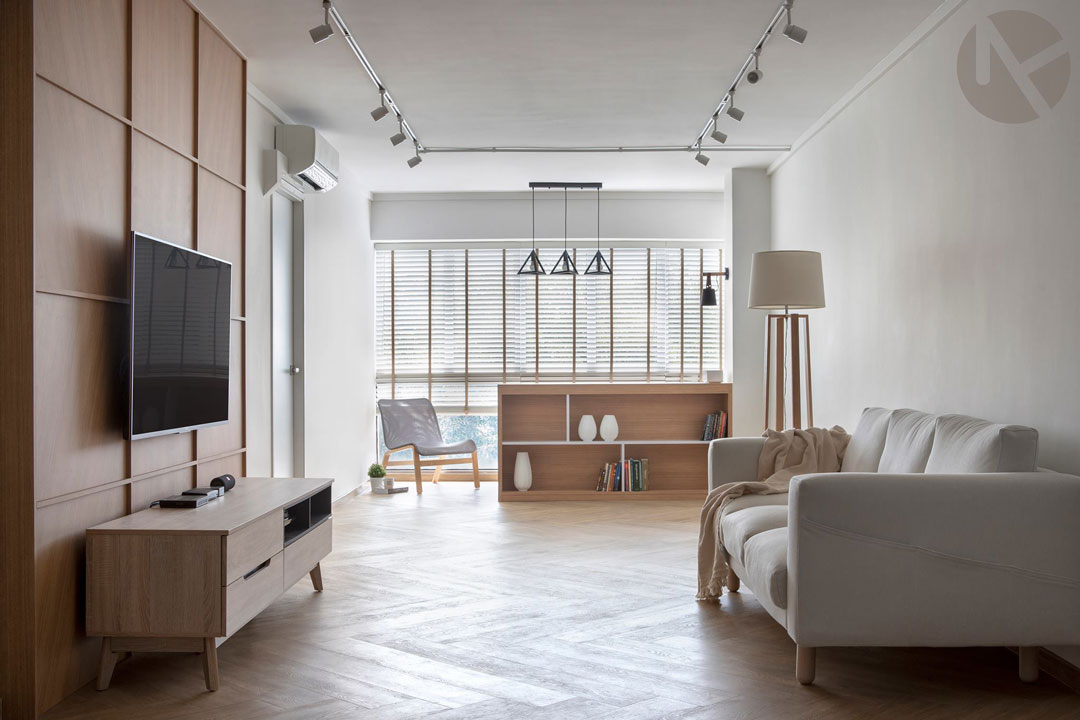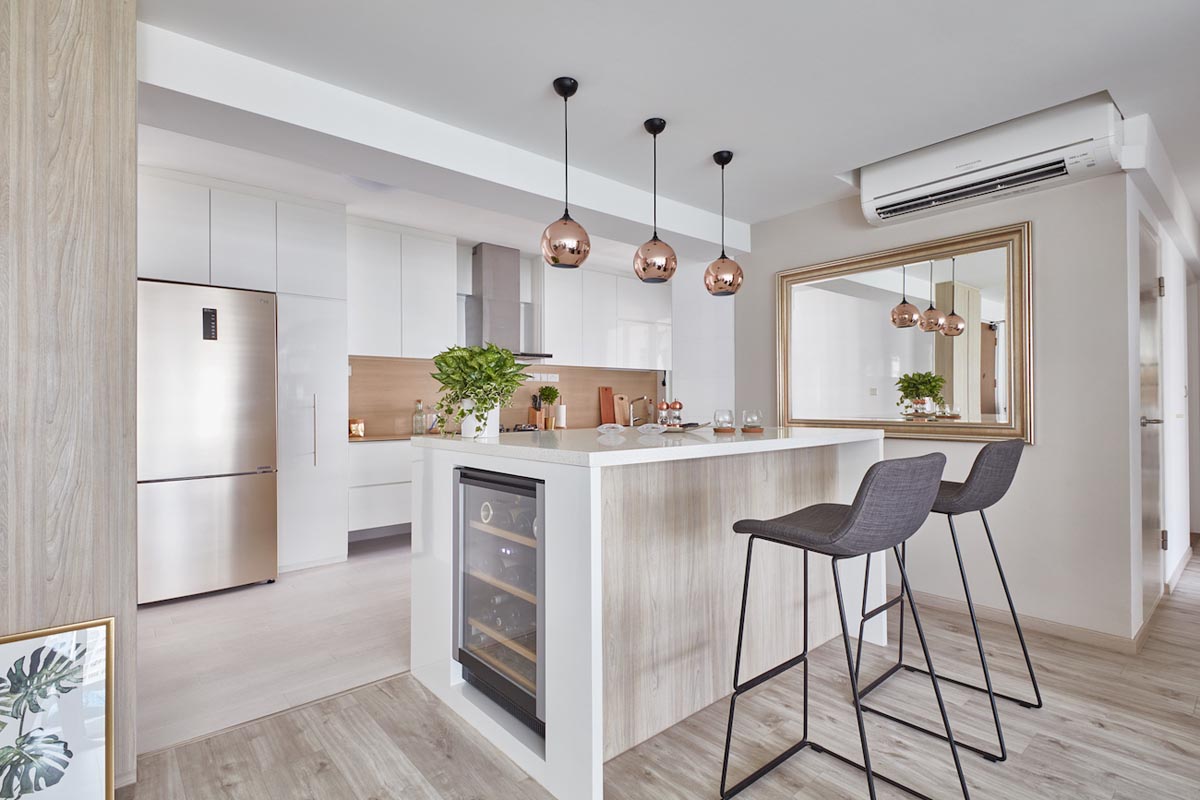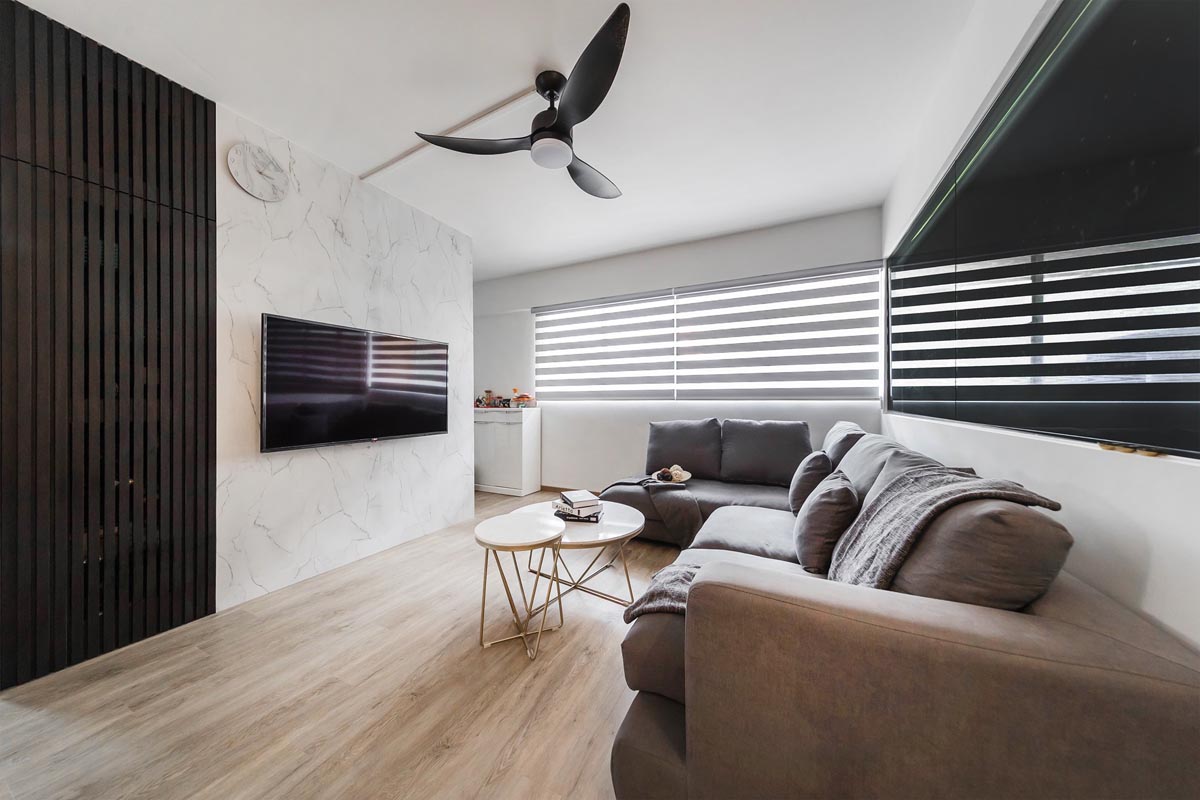Ask the experts: Vinyl flooring and what you need to know

It’s been a while since our last Ask the Experts , a series where we share insights and tips from industry pros on a number of home-related and renovation topics, vastly ranging from home theatre systems to wine storage.
This time, we’re turning our focus to vinyl flooring—a popular flooring material among homeowners in Singapore. If you’re considering this for your new home, we put together all that you need to know.
To help us with this, we roped in experts Nicholas Choo from Olim, who is the distributor for French vinyl brand Tarkett, as well as Jimmy Leong, general manager of Inovar, who carries their own brand of vinyl flooring.
Nicholas: There is Roll Vinyl, which comes in either homogeneous or heterogeneous forms. The former is made up of a single layer of material while the latter is made up of multiple layers of materials.
For heterogeneous vinyl, look out for the thickness of the wear layer (top layer of the vinyl). The thicker the wear layer, the longer and more durable it is.
Then there are Sheet types of vinyl, which are typically in rectangle or square tile shapes. Sheet types are mostly heterogeneous, although some come in homogeneous forms.
Click Vinyl types use a click system to attach rigid or semi-rigid planks or tiles together without the need for adhesive, making installation easier. This is a good option if you are going the DIY route or if you want your renovation to be completed faster.
Click Vinyl is thicker and more rigid than sheet types, so you can’t create or cut profiles and designs like circles and other shapes around objects that you can do more easily with Sheet Vinyl.
There is also the Luxury Vinyl Tile, which is the international term for vinyl flooring that comes in patterns that resemble wood or stone. In Singapore, some sellers use the terms ‘Herf’ or ‘Lurf’ instead.

Loose Lay Vinyl is also similarly easy to install. It features an anti-slip backing and can be quickly installed without adhesive.
There are also vinyl derivatives like Stone Plastic Composite (SPC) flooring and Wood Plastic Composite (WPC) flooring. SPC uses limestone as the main filler instead of PVC.
This flooring type is very dense and rigid. It also features an acoustic underlayment to reduce noise while walking on them. WPC, on the other hand, features a top layer of vinyl with wood components in its base layer. Marketed as waterproof, this is more commonly used for outdoor decking.
Nicholas: Sometimes known as “off gas”, VOCs are released from all materials and not just vinyl flooring. VOCs are a concern as we spend more time indoors, and all this accumulation of VOCs can tax our respiratory system and kidneys over time.
They affect pets and children more as they have smaller organs and have more sensitive skin.
There are also studies that have shown that an increase in skin disorders and asthma in urban environments have been linked to VOCs. That being said, VOCs are unavoidable, but we can aim to reduce its exposure.

Jimmy: Besides VOCs, you will also want to pay attention to phthalates. They are basically a type of industrial chemical used to soften PVC or vinyl during the production. It also acts as binding agent for the PVC particles in vinyl flooring.
Excessive exposure to this chemical may lead to asthma, attention-deficit hyperactivity disorder, breast cancer, and even neurodevelopment issues.
As homeowners, find a supplier whose vinyl flooring are phthalates free and low in VOC emissions. Always ask for test results so that you can have a peace of mind knowing that your family members are not exposed to excessive and unnecessary health risks.
Jimmy: Firstly, track record. The longer the supplier has been around in this business, the more assurance you get in knowing that they are reliable. Essentially, bad products and services don’t last long in the market because of word of mouth.
Secondly, green label certification. Always check that the product achieves the correct Green Label Certification from the Singapore Environment Council (SEC). Having this certification not only ensures that the product is environmentally friendly, but also free from harmful toxics.
And why should you always check that it’s the right certification? Many vinyl flooring suppliers fail to get the Green Label Certification for the PVC/Vinyl Flooring sub-category due to the strict regulations in place so they apply for the certification in another sub-category, which gives them the label that they unethically slapped onto their products.

Nicholas: One can also consider the manufacturer’s presence and support. Do they have a local or regional office? This is a consideration as dealers and distributors can change, but you will want to know that manufacturer will be able to solve any problems and back the warranty.
Ask yourself also why only certain vinyl brands are allowed to be used in large commercial projects.
Commercial projects usually have higher requirements and they need a lot of testing certs and statements of conformity. Definitely something to think about and look into when you are searching for a specific vinyl brand.

Jimmy: It depends on the thickness and material composition e.g. whether it comprises pure virgin vinyl or recycled vinyl. Rather than being eco-friendly, recycled vinyl is likely made up of materials that have been part of a waste stream.
On average, a good grade 5mm thick pure virgin vinyl flooring should cost somewhere around SG5 to 6 per sqft in the market, inclusive of installation. Anything below and I would be a bit more wary of the quality.
Jimmy: Vinyl flooring comprises a range of materials but mainly PVC, which makes it essentially water-resistant. It therefore doesn’t warp easily. Warping may possibly occur if there’s constant water seepage and no effort has been made to resolve or stop the source of water seepage.

Nicholas: Rather than warping, the more common issue with vinyl flooring is contraction and expansion due to factors like temperature changes in the ambient environment or improper installation.
This may appear to buckle the vinyl plank so it looks like it’s warping. However, this is primarily a quality issue due to the different material composition of the vinyl flooring by manufacturers.
Material composition is usually a trade secret. Some vinyl floorings have fibreglass in their composition, and this stabilises the product to reduce expansion and contraction.
Experienced installers will also be able to take into account this expansion and contraction and provide space allowance during installation.

Nicholas: A good vinyl flooring can be mopped and wiped with a normal household cleaning agent. Durability depends on the wear layer and also if there is any additional coating such as polyurethane on them.
Most are durable enough such that you can use chairs with castor wheels on them. from chairs.
Jimmy: Vinyl flooring was manufactured with practicality in mind so it is extremely easy to maintain. Spill anything? Make sure you wipe it off immediately so that it doesn’t leave a residue on the surface.
This article was first published in Renonation.